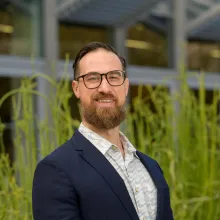
Cannabis Law and Regulation Concentration
The Cannabis Law and Regulation (CLR) concentration being offered in partnership between the University of Arizona James E. Rogers College of Law and the Attorney General Alliance (AGA), addresses the need for accredited legal training in the rapidly growing U.S. intrastate cannabis market.
The Attorney General Alliance (AGA) is an educational non-profit organization with membership including 51 U.S. state and territorial attorneys general and a wide variety of public and private sector partners. AGA serves as a forum for bipartisan cooperation and conversation within the attorney general community to cultivate knowledge, cooperate on concerns, and coordinate actions to strengthen their members’ dedicated public service.
AGA plays a central role in educating diverse stakeholders, through its Cannabis Project, about trends in cannabis laws across the country. They provide interested entities with the most up-to-date and objective information available to ensure clarity for local and state law enforcement, the preservation of public health and safety, and the development of best practices across state and local jurisdictions. This is accomplished through meetings conducted throughout the year, in a public/private partnership setting, and the publication of the Cannabis Law Deskbook, in partnership with Thomson Reuters. Collaborating with UA COL aligns with AGA’s mission to share its expertise on cannabis law and regulation with a broad legal community.
The concentration will be offered fully online and asynchronously, with the first courses being made available to students in University of Arizona Law’s Master of Legal Studies (MLS) program and then the Bachelor of Arts in Law (BA) program. The six foundational CLR courses, designed in collaboration with the College of Law Instructional Design team and AGA experts, will cover a range of topics, including the legal considerations facing market participants and public actors, criminal justice reforms, regulatory controls, banking and financial transactions and regulating novel and intoxicating hemp-based cannabinoids in the absence of federal law.
Duration of Degree
The Master of Legal Studies Degree, with a Cannabis Law and Regulation concentration, is a one-year degree program when pursued full time or two or more years when pursued part time. The stand-alone CLR concentration is completed fully online, with five to six asynchronous, fully online courses.
This degree requires the completion of approximately ten courses (five cannabis law courses and five required core legal foundation courses). Online courses are 7.5 and/or 6 weeks in length. They are offered during the fall, spring and summer semesters.
Application Information
Email the James E. Rogers College of Law MLS/BA team if you have questions regarding the CLR courses.
Required MLS Core Courses (15 UNITS)
- LAW 501* - Procedure (3 units)
- LAW 502A* - American Common Law System I (3 units)
- LAW 502B* - American Common Law System II (3 units)
- LAW 504* - American Public Law System (3 units)
- LAW 507* - Legal Analysis, Writing, and Research (3 units)
Required Courses for this Concentration (3 UNITS)
(BA in LAW students please consult with your advisor. All 520 courses may be taken at the 400 level as BA electives.)
- LAW 520A* - Intro to Cannabis Law and Regulation (3 units)
Elective Courses (12 UNITS)
- LAW 520B* - Cannabis Legalization and Use: Public Health Implications (3 units)
- LAW 520C* - Cannabis Operations from Seed-to-Sale (3 units)
- LAW 520D* - Implementing State Cannabis Programs (3 units)
- LAW 520E* - Cannabis, Policing, and Equity (3 units)
- LAW 520F* - The National Market for Hemp-Based Products (3 units)
Some substitutions may be permitted with the approval of the program director. Availability of non-LAW electives is at the discretion of the offering college or department and may incur additional costs.
Cannabis Law and Regulation Courses (fully online)
The information provided in these courses reflects the opinions of the individual instructors and does not express an opinion of an Attorney General, an Attorney General’s Office, a state or regulatory authority, or any other governmental entity.
Fall Session 1 (August–October)
Intro to Cannabis Law and Regulation (3 units) Law 420A 520A

Taught by Professor Cole White
Special Counsel, Attorney General Alliance
Developed by Professor Austin Bernstein
Senior Manger of U.S. State Public Policy
This course provides an overview of cannabis law and regulation and the historical and political benchmarks that have propelled us to the landscape we are in today, where the policies of the U.S. federal government and various states stand in direct opposition. Under federal law, cannabis (other than low-grade hemp) is a Schedule I narcotic in the Controlled Substance Act. In contrast, cannabis for medicinal purposes is available in 37 states, and adult-use cannabis for individuals 21+ in 23 states. Seminal questions will be addressed: What is the cannabis plant? Why are individuals using cannabis for medical or recreational purposes, and what are the public health implications of proliferated use? How did cannabis, referred to as marijuana in federal law, become outlawed by the Controlled Substances Act? Over the last twenty-five years, how have advocates, business actors, individuals, and government agents, successfully advocated and implemented state-level reforms? What is the relationship between the state governments and various interested stakeholders? How do these relationships impact the balance of the regulated marketplace? What are the current cannabis laws on the books in the states, and how should you advise clients and stakeholders about those laws?
Fall Session 2 (October–December)
Public Health Implications of Cannabis Legalization (3 units) Law 420B 520B

Taught by Professor Eliza Muse
Planning & Evaluation Officer
Alaska Mental Health Trust Authority
Developed by Professor Shannon O'Fallon,
Oregon Attorney General's Office, Portland
Oregon Senior Assistant Attorney General, General Counsel Division
Legalizing cannabis for medical and adult use requires an investment in public health infrastructure. Public health authorities, especially state and local, are at the forefront of protecting vulnerable populations from the negative consequences of cannabis use and also serve as a convener of scientific authority concerning the therapeutic benefits and potential harms of cannabis use. Due to federal illegality, the nation’s robust federal public health infrastructure, managed by the U.S. Department of Health and Human Services (the Food & Drug Administration and National Institute of Health), is notably absent. State and local governments have had to do more with fewer resources. This course will address seminal questions in the cannabis legalization movement: How has cannabis legalization impacted public health? How is cannabis use and cannabis use disorder monitored? How can public health campaigns serve to educate consumers about choices? What is the role of public health authorities in regulation? What does a growing body of scientific literature demonstrate concerning the therapeutic benefits and potential harms of cannabis use?
Spring Session 1 (January–March)
Cannabis Operations from Seed-to-Sale (3 units) Law 420C 520C

Professor Harinder Kapur
Senior Assistant Attorney General, Cannabis Control Section
California Department of Justice, Office of the Attorney General

Professor Ashley Balducci
Deputy District Attorney in the Civil Division of the Clark County District Attorney's Office
This course will teach students about cannabis operations from seed to sale, from cultivation through retail sales to consumers and other ancillary license types. The course will describe cannabis operations from seed to sale. Students will learn about the core license types, including cultivation, production/processing/manufacturing, testing, distribution, and retail sales. The course will also introduce students to other ancillary license types, including consumption lounge, special event, and microbusiness. Students will understand the concept of seed-to-sale through the progression of each license type and vertically integrated businesses. At the end of the course, the students will analyze the operations of the cannabis industry from the seed planted at cultivation through the sale to a customer.
Spring Session 2 (March–May)
Implementing State Cannabis Programs (3 units) Law 420D 520D
Professors Ashley Balducci and Harinder Kapur
This course will teach students about cannabis regulatory schemes in some states to first legalize cannabis, beginning with medicinal cannabis and then going into an in-depth coverage of adult-use cannabis. The course will describe the legalization of cannabis for some of the first states to legalize it. Students will learn about the progression of legalization from medicinal to adult use in those jurisdictions. The course will also introduce students to the groups that were excluded or had restrictions placed as part of the new regulatory models in some states. Students will understand the state and local authorities’ responsibilities in regulating cannabis. Students will also identify and explain the market composition of the cannabis industry, including the different license types and the various cannabis programs within the United States. At the end of the course, the students will analyze the cannabis regulatory frameworks implemented in those jurisdictions.
Summer Session 1 (May–July)
Cannabis, Policing, and Equity (3 units) Law 420E 520E

Taught by Professor Sarah Gersten
Executive Director and General Counsel
Last Prisoner Project
Developed by Professor Cat Packer
Director of Drug Markets and Legal Regulation at Drug Policy Alliance
Cannabis policy is an issue of social and racial justice. The origins of cannabis prohibition are directly related to racism against Black, Indigenous, and people of color (BIPOC) communities. Moreover, for the last fifty-plus years, cannabis has remained a Schedule I narcotic under the federal Controlled Substances Act. In that timeframe, federal, state, and local law enforcement have conducted a “War on Drugs'', resulting in the arrest and incarceration of thousands of Americans. The data concerning the outcomes of the War on Drugs reveals that communities and individuals of color have borne a disproportionate brunt of the War on Drugs. Reorienting the focus of state and local law enforcement away from cannabis criminalization has emerged as a primary driver of cannabis reform. However, as cannabis reforms are achieved, numerous questions remain. How to account for the harms of cannabis prohibition? How can the government mitigate collateral consequences for individuals and communities impacted by cannabis policy? How can the government reorient its priorities and resources away from criminal enforcement while also maintaining public safety and health in communities? What penalties exist after decriminalization, legalization, and regulation-related reforms are passed? What regulatory decisions shape market access and control? How to build an equitable cannabis industry? How can cannabis reform be a vehicle to advance equity in local, state, and federal policy? This course will explore how criminal justice reforms are linked and leveraged in cannabis state reform; the legal impacts of cannabis reforms on individual users, businesses, and government; ongoing authority and challenges facing law enforcement and government efforts to advance equity objectives within cannabis law and policy.
Summer Session 2 (July–August)
The National Market for Hemp-Based Products (3 units) Law 420F 520F

Professor Andrew Goff
Deputy Attorney General for the State of Hawaii
In 2018, through the Federal Farm Bill, Congress amended the Controlled Substances Act by removing “hemp” from the definition of “marijuana.” The carve-out resulted in a rush to market across the country with new products, including cosmetics, beverages, vaporizers, and pet food. The market proliferation has occurred without any additional federal regulatory oversight. This course will explore the variety of forms hemp is made available to the public and the unique legal and regulatory challenges facing public authorities, market suppliers, and consumers participating in the hemp market space. Key questions will be asked and answered: What are the chemical and functional similarities and differences between hemp and marijuana? What is cannabidiol, and how does it impact the body? What does the scientific and academic literature suggest about the efficacy and harms associated with long-term hemp consumption? In what forms are hemp and hemp-derived products being made and sold to consumers? How are state governments addressing the regulation of hemp cultivation, manufacture, and sale? What are the current and proposed future regulatory pathways available under federal law for hemp and hemp products? How might good manufacturing processes (GMP) be applied to ensure a safe and stable hemp supply chain?
